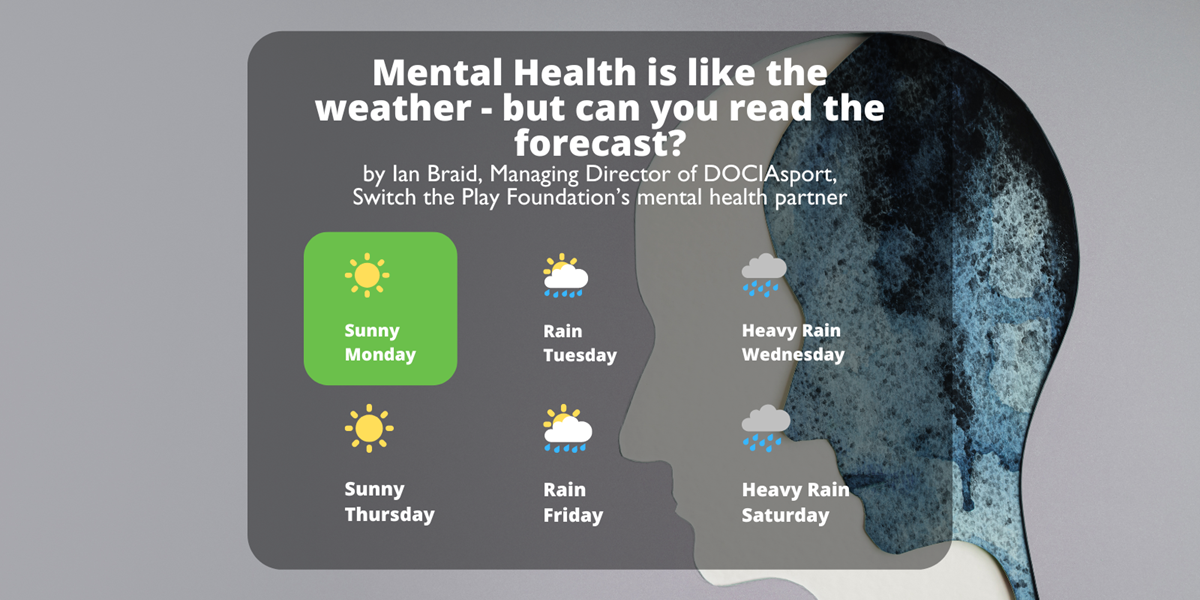Mental Health is like the weather - but can you read the forecast?
Posted on: 09 May 2022 by Ian Braid, Managing Director of DOCIAsport, Switch the Play Foundation’s mental health partner

A couple of years ago thanks to the courage of my son - who asked me whether I was working too hard – and my lack of joy at the arrival of a 12 week old puppy (when the rest of the house was delirious with happiness) I realised I was mentally ill. This was confirmed by my GP who said I had severe depression and general anxiety disorder.
The sad truth of the matter was I just didn’t see this coming because my decline into this pit of isolation and darkness had been incremental over a substantial period of time. So how I felt each day was I believed the ‘new normal.’
In hindsight, some of the mistakes I made along the way included:
- Not talking about how I was feeling to my family, friends or in work.
- Focussing on the quantity of work I was doing and not the quality. I knew that I was overwhelmed with responsibility and things to do. My mistake was working harder in a way that I already knew wasn’t working and not looking taking time off either during the day or holidays.
- Thinking the key people in my life were avoiding me - when in fact it was me who was withdrawing. The feeling of loneliness was of my own making.
There was only going to be one outcome with this lack of awareness of my own mental health and that became quite drastic. Time off work followed by resigning from my job as the Chief Executive Officer of the British Athletes Commission (BAC). During my time at the BAC, I had the privilege of offering advice, support, and guidance to many high performance athletes across a variety of Olympic and Paralympic sports – many with mental health issues. When I eventually sought professional help, I was told I had had five years of vicarious trauma helping others and yet I had failed to look after myself.
Losing my job meant I lost my sense of purpose and that made me even more vulnerable to staying depressed for an even longer period - or worse. But I eventually realised that I wasn’t alone in failing to take care of myself and that I might be able to help others from becoming like me or helping them see a way forward. A way to leave the dark, damp overcast weather in my head that I suffered and walk towards the sunshine.
I now see my mental health very much like the weather in that it is dynamic – it changes constantly. It isn’t binary for sure; no one has either good or bad mental health. For me things are ok if the weather (my mind) is sunny with cloudy intervals i.e., there are good times and bad times – and, critically, I can respond to either. When its ‘sunny’ for instance I can get my critical work done because I feel good. When its ‘cloudy’ I recognise the need to act – either go somewhere ‘sunnier’ - have a break or do something else - or hunker down and give myself the promise of a reward later.
The reason why I like the weather analogy is because weather changes and so does mood and our mental health because we have to deal with life and whatever it throws at us. So, we have to be constantly aware of our mental health and our capacity to deal with everyday stresses and strains and the occasional bigger challenges. Being aware of one’s mental health is one thing, making sure you look after it is another.
Taking regular breaks either during the day or for holidays; getting good sleep, exercising etc. We all know they are the right things to do but how pro-active are you in maintaining good mental health – really? Or are you simply good at being reactive? In itself that is no bad thing, but I think we could all do better – me included. This blog is being written for Mental Health Awareness Week – but every week should be a mental health awareness week; for all of us. Are you up for the challenge?
What I can’t stress strongly enough is that you don’t have to tackle mental health awareness on your own. In fact, as I learnt to my cost, that’s a terrible thing to do. One of the actions I took after my recovery was to establish what I refer to as my ‘personal board.’ This is a small group of trusted individuals – and as it happens Fred the aforementioned dog – who know me very well and as well as recognising the changes in my behaviour have my permission to check in with me and ask (twice) whether I am ok.

Fred Braid – a member of my personal board.
Trust and consequently feeling safe is critical to good mental health. Sadly, there is still a stigma attached to mental illness for some and anyone suffering has to feel supported and if necessary signposted and encouraged to seek professional help. Think about creating a personal board and who would be on it.
If you are effectively on someone else’s ‘board’ think about when you last checked in properly to see if your friend or colleague is ok. If its time to check in, plan ahead - think about when and where you might offer your support and make sure you have enough time and avoid any other distractions like a phone. Consider a walking meeting then there’s the benefit of being outside and not having constant eye contact.
So, in this Mental Health Awareness Week take some time to reflect on your own mental health and what you might do differently to take (better) care of yourself. Be kind to yourself. If you do that you will be in a better position to give care to others. Perhaps contact someone you haven’t heard from in a while and check if they are ok. Take and give care.
If you're struggling, or are worried about someone else, here are some places you can turn to get support.